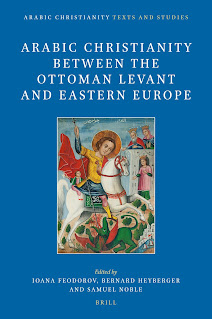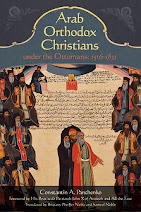Arabic original here.
"I am of the Party of those who have Died"
"Talking about war has come to be corrupting, like war itself. But I belong to the victims of Sin el-Fil and with the same feeling I belong to the southern Dahieh and to the camps. I am of the party of those who have died. All of them are at the same distance from God because those tormented are of the wounded body of Christ who sits at the right hand of God. My brothers died in Sin el-Fil. Husayn is martyred in the Dahieh and the funeral of Palestine is in Lebanon" (Metropolitan Georges Khodr, "From Sin el-Fil ad the Camps," in an-Nahar, May 28, 1985).
We recall the words of Metropolitan Georges Khodr during the Lebanese wars in order to talk about Aleppo. Khodr identified with the Christian dead of Sin el-Fil, the Shi'ite dead of the Dahieh, and the Sunni Palestinians dead. He said that he belongs to "the party of those who have died," the party of the victims. He regarded them all as brothers. He did not sorrow over the Christian more than he did over the Muslim. He did not gloat over the dead, no matter what side they belonged to. They all came to belong to one body, "the wounded body of Christ." What the world had separated, the blood of Christ, shed for all the world, brought together.
I belong to the victims of West Aleppo and East Aleppo equally. I belong to the victims of all Syria, Syria the grieving mother who "does not want to be consoled" (Matthew 2:18) because her children are no more. Death has taken them from her breast. She is my mother and all of them are my brothers. How can I separate one brother from another? How can I love one of them more than the other? How can I be glad at their death? How can I hate them? How can I rejoice at their misfortune? My God, "You have multiplied your slain in this city, and you have filled its streets with the slain" (Ezekiel 11:6).
Let us return to Metropolitan Georges Khodr, the greatest person to have written about hope in the time of war. He says, "The nation is not an inheritance for profligate children to scatter... God did not entrust the nation to dirty hands. They misappropriated it... Nations are threatened by their sins. They have all grown weary of war and talk of war, of initiators and those responsible, of traitors and those with interests. What remains of acts of heroism if 'they divided My garments among them and for My clothing they cast lots'? The amount of blood and the amount of terror cancels the quality of every song that they have distorted into a war anthem" ("This is the Testimony," in an-Nahar, May 6, 1979).
Syria was scattered by her profligate children, profligate with corruption, love of power, tyranny and self-deification. Syria was misappropriated by dirty hands coming from every direction, from within and without. What is the value of acts of heroism and victories if the Syrian citizen alone is the one to pay the price with his own blood and the blood of his children? Has Cain (in Islam, Qabil) triumphed over Abel?
We close with Metropolitan Khodr, because we are in dire need of someone to remind us of political and national morals. He says, "On the moral level, it must be said that those who have contributed to the destruction of the country cannot govern it because they have lost their credibility. People have grown weary, weary of masks... They seek faces. Lebanon [Syria at the present] will expel every war criminal, for the coming generations will not bear the country's responsibility so long as it does not completely reject the merchants of death."
Syria will not be made by wars. Syria will be made by those of her children who strive for peace. They are her worthy children. They are the witnesses of her unity and her inevitable resurrection.
"I am of the Party of those who have Died"
"Talking about war has come to be corrupting, like war itself. But I belong to the victims of Sin el-Fil and with the same feeling I belong to the southern Dahieh and to the camps. I am of the party of those who have died. All of them are at the same distance from God because those tormented are of the wounded body of Christ who sits at the right hand of God. My brothers died in Sin el-Fil. Husayn is martyred in the Dahieh and the funeral of Palestine is in Lebanon" (Metropolitan Georges Khodr, "From Sin el-Fil ad the Camps," in an-Nahar, May 28, 1985).
We recall the words of Metropolitan Georges Khodr during the Lebanese wars in order to talk about Aleppo. Khodr identified with the Christian dead of Sin el-Fil, the Shi'ite dead of the Dahieh, and the Sunni Palestinians dead. He said that he belongs to "the party of those who have died," the party of the victims. He regarded them all as brothers. He did not sorrow over the Christian more than he did over the Muslim. He did not gloat over the dead, no matter what side they belonged to. They all came to belong to one body, "the wounded body of Christ." What the world had separated, the blood of Christ, shed for all the world, brought together.
I belong to the victims of West Aleppo and East Aleppo equally. I belong to the victims of all Syria, Syria the grieving mother who "does not want to be consoled" (Matthew 2:18) because her children are no more. Death has taken them from her breast. She is my mother and all of them are my brothers. How can I separate one brother from another? How can I love one of them more than the other? How can I be glad at their death? How can I hate them? How can I rejoice at their misfortune? My God, "You have multiplied your slain in this city, and you have filled its streets with the slain" (Ezekiel 11:6).
Let us return to Metropolitan Georges Khodr, the greatest person to have written about hope in the time of war. He says, "The nation is not an inheritance for profligate children to scatter... God did not entrust the nation to dirty hands. They misappropriated it... Nations are threatened by their sins. They have all grown weary of war and talk of war, of initiators and those responsible, of traitors and those with interests. What remains of acts of heroism if 'they divided My garments among them and for My clothing they cast lots'? The amount of blood and the amount of terror cancels the quality of every song that they have distorted into a war anthem" ("This is the Testimony," in an-Nahar, May 6, 1979).
Syria was scattered by her profligate children, profligate with corruption, love of power, tyranny and self-deification. Syria was misappropriated by dirty hands coming from every direction, from within and without. What is the value of acts of heroism and victories if the Syrian citizen alone is the one to pay the price with his own blood and the blood of his children? Has Cain (in Islam, Qabil) triumphed over Abel?
We close with Metropolitan Khodr, because we are in dire need of someone to remind us of political and national morals. He says, "On the moral level, it must be said that those who have contributed to the destruction of the country cannot govern it because they have lost their credibility. People have grown weary, weary of masks... They seek faces. Lebanon [Syria at the present] will expel every war criminal, for the coming generations will not bear the country's responsibility so long as it does not completely reject the merchants of death."
Syria will not be made by wars. Syria will be made by those of her children who strive for peace. They are her worthy children. They are the witnesses of her unity and her inevitable resurrection.








No comments:
Post a Comment